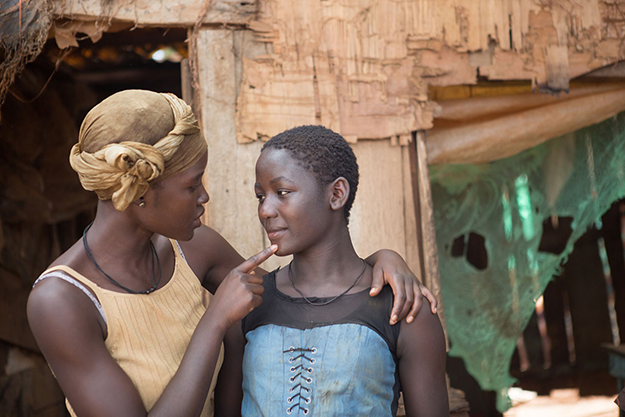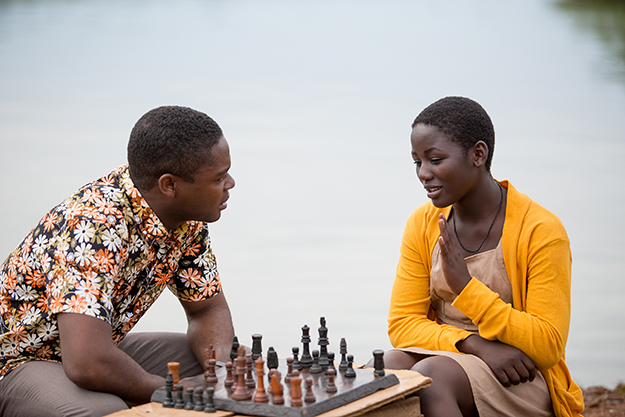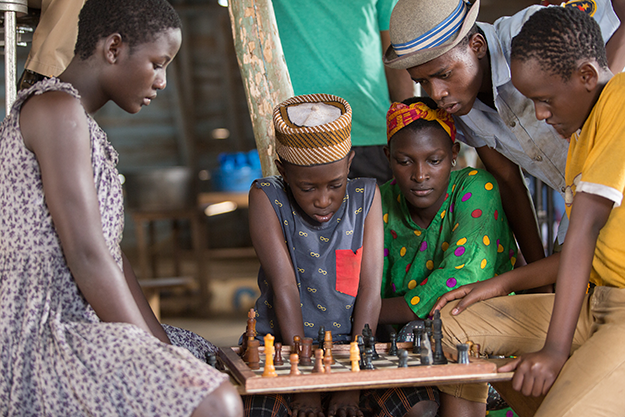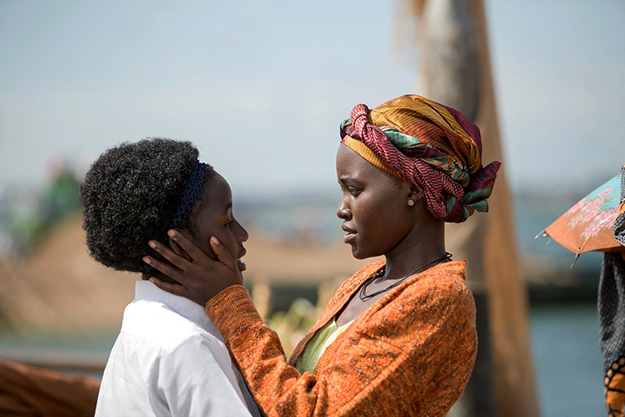Deep Focus: Queen of Katwe

In Queen of Katwe, the director Mira Nair captures the vitality and improbable beauty of the dense, crowded street culture in an East African slum without sentimentalizing its people or underplaying their deprivations and hazards. It’s an elating achievement, and it’s all the more remarkable because she pulls it off in the context of an underdog sports movie. This surprisingly juicy film is based on the true story of Phiona Mutesi (Madina Nalwanga), a girl from Katwe, a sprawling, blighted district in Uganda’s capital, Kampala. She took up chess when she was 9 and, as Nair vividly chronicles, became an international competitor and national champion in her early teens.
William Wheeler, the screenwriter, working from a nonfiction book by Tim Crothers, engineers the ups, downs, and sideways motions of her ascent without making it seem easy or surrendering to glib statements about “destiny.” Phiona’s sturdy, sensitive coach, Robert Katende (David Oyelowo), instructs her and his other students, a group he calls his “Pioneers,” on the necessity of devising a plan to conquer risks and obstacles in games and in life. During a critical match, she breaks concentration and falters. He then breaks character and steadies her by shouting, “You belong here.” He’s not acting as an oracle but as a mentor who teaches her everything he knows; he learns that she has talents far beyond his own.
Between victories and setbacks, Wheeler’s script leaves Nair and her cast plenty of room to fill with unpredictable behavior. This wily, intuitive director and her team, notably cinematographer Sean Bobbitt and editor Barry Alexander Brown, plunge us into Katwe’s packed thoroughfares and alleyways, where Phiona’s mother, Harriet (Lupita Nyong’o), sends her older children out to hawk husks of corn, waving them at the windows of potential buyers whose cars inch along the muddy streets. Harriet doesn’t grow the maize her children peddle or the vegetables she sells at her stall. She purchases it for resale from a stingy supplier. When he says he’ll give her the goods for free if she offers him something gratis, she demonstrates what she’d give him by spitting in the street.

Nyong’o and Oyelowo provide this movie with its sinew and fire. At first, it’s shocking to see the lithe, young, and gorgeous Nyong’o in the role of a stubborn, weary matriarch. But it makes perfect tragic sense: Harriet is part of a cycle of children begetting children. Nyong’o emits the pride and stamina of a woman who prizes her own hard-earned wisdom and is determined to keep her daughters from making the same mistakes. Oyelowo is more remarkable as Katende, a man who graduated from a university as well as the school of hard knocks. As Katende finds his calling back in the streets, Oyelowo does what’s nearly impossible: he embodies goodness and virtue playfully and thoughtfully. Nyong’o, Oyelowo, and the rest of the cast draw us into these lives without simplifying the pressures each character must face or ignoring the corruption and class bias that trickle down to Katwe from the upper strata of society. When Katende goes after a well-paying job, his interviewer jokes about how remarkable it would be to have a man of integrity at Uganda’s National Water Company. Later, when Katende attempts to enter his Pioneers in a competition held at a swank secondary school, Kings College Bodo, the snooty headmaster doesn’t want street kids sullying his campus. He agrees to admit them only if they can pay the hefty entrance fees. He underestimates Katende’s drive and ingenuity.
Filming in Uganda on the sites of the real events and on location in South Africa, Bobbitt uses his wide-angle lens to capture Katwe as a throbbing maze. This panorama of humanity spills out over all four edges of the screen. We immediately see that Katwe’s poverty hasn’t dulled its citizens’ appetites for color or sensuality. They express their individuality and spiritual liberty in their clothing. Wild tints from bright orange to deep purple merge in kaleidoscopic fashion, along with textures that are rough, silky, and everything in between. They dance with a galvanic joy of movement and convey a coiling energy when they walk.
Harriet is just about destitute, but her bearing is at once rooted and regal: you could argue that she is the Queen of Katwe. A single mother of four (a fifth child died, as did her man), she’s a fierce protector of her brood, with a wary gaze and a steady tread. Her middle kids, Phiona and Mugabi Brian (Martin Kabanza), dance and chant as they peddle their wares, their bodies loose, their limbs punctuating their words with a fluid kind of twitching. They sing in an exuberant African style replete with bracing, otherworldly harmonies. At the start, Harriet’s little boy Richard (played first by Nicolas Levesque, then by Ronald Ssemaganda) is still a babe in arms, and her pretty older girl, Night (Taryn Kyaze), has begun to step out at night with long, tall Theo (Maurice Kirya), a smooth guy on a motorcycle. Harriet scolds her, not realizing that she’s putting Night, and the rest of her kids, in a protective box. She’s correct to mistrust Night’s judgment and Theo’s motives because she doesn’t want her girls to bear children before they possess the maturity and stability to care for them. Harriet feels she can keep them safe only if they continue to do exactly what they’re doing for her now. So she distrusts chess as much as she does boys on motorcycles. She wishes she could concentrate on the calamities she can foresee if not control, like the area’s devastating floods.

Nyong’o acts with scarifying glares and moans and hisses. She sets an outsize mode of performance for the entire movie, and she makes it feel simultaneously theatrical and real. As an illiterate woman who carves her own path through Kampala, Nyong’o proves to be a master of nonverbal communication. With a flip of her hand or a blazing glance, she knows how to make a show of anger. When Katende pays tribute to Harriet as a mother, her beaming gratitude radiates straight from her heart. In 12 Years a Slave Nyong’o played a woman who discovers that all her good qualities could be turned against her. It’s exhilarating in Queen of Katwe to see this actor play a woman whose courage renews her strength.
The ensemble is seamless. The young characters’ finger-snapping gestures and elongated shrugs become part of their natural expression. Each of them is individualized, but the focus is on Phiona. Plucked from a dance academy for this leading role, Nalwanga roots her difficult part in a canny emotional distance and intelligence. Nalwanga gives Phiona not just a poker face, but a chess face, imbued with mission. We’re as jolted and persuaded as Katende is when he learns that Phiona can scan a board and think eight moves in advance. Nalwanga’s reserve makes it all the more moving whenever Phiona drops her chess-player persona and becomes a little girl again, yearning for her mother’s love and her rebel sister’s company.
As Dr. Martin Luther King in Selma, Oyelowo was superb in his oratory but stilted when he left the podium. In Queen of Katwe, he aces a multifaceted performance. In his nimbleness on the soccer field and his quick thinking in the snooty headmaster’s office, he conveys the reflexes of a man primed for survival: Katende barely knew his mother, who died when he was 8, and he was raised by a series of aunts. Yet Oyelowo is admirably matter-of-fact as Katende begins coaching soccer in a sports outreach ministry while starting a family with his schoolteacher wife Sara (Esther Tebandeke). Chess is a way for him to keep his kids engaged beyond soccer and to involve other youngsters who fear getting hurt on the field. But as it becomes a catalyst for Katende’s own creativity, Oyelowo illuminates the stagecraft that goes into great teaching.

This movie contains wondrous sights, including Phiona’s first trip in an airplane, which makes her question whether she’s in heaven. Another is her first experience of snow: Nalwanga opens her face to the sky and exults in every flake. Yet nothing in this film is more miraculous, funny, or moving than Katende psyching up his Pioneers before the tournament at Kings College Bodo. Nair builds to Oyelowo’s big scene beautifully. The Pioneers fall silent when the bus drives past the school’s perfectly manicured yards and gardens. The bounteous food in the dining hall overwhelms them—and the silverware confuses them. They even yank their blankets from their assigned beds so they can sleep on the dormitory floor. The morning of the tournament, panic spreads among them like a fever; Katende discovers one player hiding under a bed. As Katende comes up with a remedy for their alarm, Oyelowo turns the scene into a comical ballet, hopping over several beds himself to position himself in front of the group. In order to calm them, and to persuade them that they have a fighting edge, he tells them a story that Wheeler has taken from one of Katende’s actual set speeches.
As Crothers records Katende telling it in the book: “So these dogs would run after cats and eat them. Unfortunately, there was a certain cat that was so fast and most of the dogs would run after it and fail to get it. So one time the fastest dog, who liked to show off his speed, was challenged by the other dogs . . . The fastest dog ran after the cat. He was gone for a long time and finally came back and he hadn’t caught the cat. So the other dogs asked, ‘What happened?’” Oyelowo, with a wonderful, tempered gaiety, brings the fable’s message home: “Me, I was just running for a meal that I can get somewhere else. That cat was running for its life.”
That story also applies to the filmmakers. Many big-studio films are simply meal tickets. After the fiasco of her Earhart biopic Amelia (09) and the disappointment of her political thriller The Reluctant Fundamentalist (13), Nair has made Queen of Katwe with the passion of someone fighting for her creative life. Like Phiona, she may stumble on occasion, but when she really bears down on a challenge, she triumphs.
Michael Sragow is a contributing editor to Film Comment and writes its Deep Focus column. He is a member of the National Society of Film Critics and the Los Angeles Film Critics Association. He also curates “The Moviegoer” at the Library of America website.







